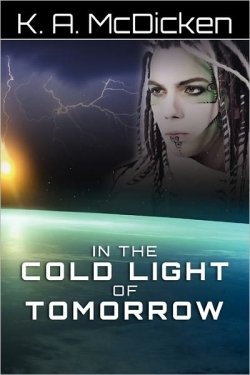In the Cold Light of Tomorrow
Mutant human and animal species make a regular appearance in the science fiction genre, and K.A. McDicken’s novel is no exception. In the Cold Light of Tomorrow takes place in the aftermath of a catastrophic comet impact, a near collision that has left the Earth with mutated animals and a unique group of people endowed with special abilities, such as telepathic communication skills. Known as the New Waves, this nonviolent generation is envied by the original humans who are not endowed with these extraordinary powers. When the established population interacts with the mutants, stereotypical problems surface in their New Age society, a village called The Lake.
This intriguing story gets a high mark for exploring philosophical issues and delving into the deeper elements of human existence, but lacks the freshness needed to achieve an outstanding rank in a competitive field. Mutants in sci-fi and fantasy often result in the blending of a mediocre concept with true originality, as many books are mixed variations of the same recipe. Unfortunately, this novel presents a classic similarity that could be its downfall, for it fails to stand out from the overwhelming crowd.
In the Cold Light of Tomorrow is a thought-provoking read, however, and an interesting diversion for science fiction enthusiasts. Enhanced with a murder mystery subplot, the author propels her novel across marketing lines into yet another genre. The atmosphere is outdoorsy and quite rustic, an unusual combination for an earthbound tale with extrasensory abilities that accessorize the novel with out-of-this-world elements. Though the police officer’s investigation may be perceived as the focus of the book, the story meanders in too many directions for the “case” to stay at the forefront. New Wave protagonists include young Bradley and a large group of friends with unique skills. Viewpoint fluctuates, and channeling conversations set in italics mingle with traditional dialogue.
At times McDicken’s tone verges on Western, as can be detected in this passage: “Bradley and Jonno met the group with wagons for the children. Bradley had expected that more of the adults would be exhausted and in need of transport, but even Glen was cheerful and relieved to be over the mountains….The travelers took longer to arrive than the women expected and they were concerned that some of the cooked food would spoil. The problem was getting the carts across the river.”
K.A. McDicken has written short stories and syndicated columns in rural newspapers. She lives in Penrith, Australia. This multifaceted and somewhat complicated novel attempts to snare more than one market.
Reviewed by
Julia Ann Charpentier
Disclosure: This article is not an endorsement, but a review. The publisher of this book provided free copies of the book and paid a small fee to have their book reviewed by a professional reviewer. Foreword Reviews and Clarion Reviews make no guarantee that the publisher will receive a positive review. Foreword Magazine, Inc. is disclosing this in accordance with the Federal Trade Commission’s 16 CFR, Part 255.

